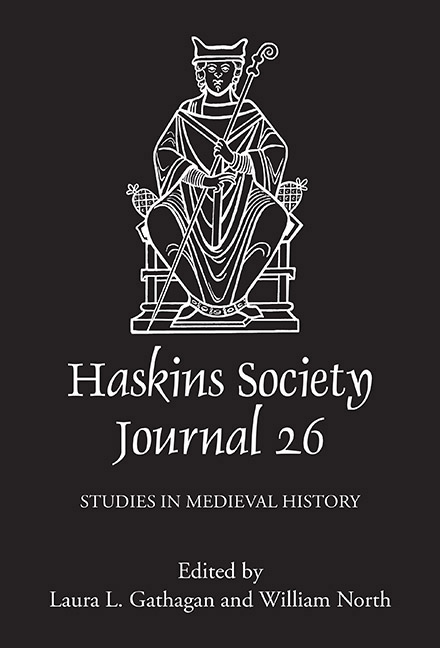Book contents
- Frontmatter
- Contents
- List of Figures
- Editors’ Note
- Abbreviations
- 1 Mores Tuos Fabricae Loquuntur Building Activity and the Rhetoric of Power in Ostrogothic Italy
- 2 A Hermeneutical Feast: Interreligious Dining in Early Medieval Conciliar Legislation
- 3 A Hypothetical Slave in Constantinople: Amalarius’s Liber Officialis and the Mediterranean Slave Trade
- 4 Welsh Kings at Anglo-Saxon Royal Assemblies (928–55)
- 5 The Diplomatics of Depredation: Reconsidering Holy Trinity Caen’s List of Losses
- 6 When Did Robert of Torigni First Receive Henry of Huntingdon’s Historia Anglorum, and Why Does It Matter?
- 7 A Coin Bearing Testimony to Duchess Matilda as Consors Regni
- 8 Fighting to be the Tallest Dwarf: Invidia and Competition in the Self-Conception of Eleventh- and Twelfth-Century Masters
- 9 Brut y Tywysogion: the History of the Princes and Twelfth-Century Cambro-Latin Historical Writing
- 10 The Use of English Annalistic Sources in Medieval Welsh Chronicles
- 11 A Franco-Danish Marriage and the Plot against England
4 - Welsh Kings at Anglo-Saxon Royal Assemblies (928–55)
Published online by Cambridge University Press: 25 May 2021
- Frontmatter
- Contents
- List of Figures
- Editors’ Note
- Abbreviations
- 1 Mores Tuos Fabricae Loquuntur Building Activity and the Rhetoric of Power in Ostrogothic Italy
- 2 A Hermeneutical Feast: Interreligious Dining in Early Medieval Conciliar Legislation
- 3 A Hypothetical Slave in Constantinople: Amalarius’s Liber Officialis and the Mediterranean Slave Trade
- 4 Welsh Kings at Anglo-Saxon Royal Assemblies (928–55)
- 5 The Diplomatics of Depredation: Reconsidering Holy Trinity Caen’s List of Losses
- 6 When Did Robert of Torigni First Receive Henry of Huntingdon’s Historia Anglorum, and Why Does It Matter?
- 7 A Coin Bearing Testimony to Duchess Matilda as Consors Regni
- 8 Fighting to be the Tallest Dwarf: Invidia and Competition in the Self-Conception of Eleventh- and Twelfth-Century Masters
- 9 Brut y Tywysogion: the History of the Princes and Twelfth-Century Cambro-Latin Historical Writing
- 10 The Use of English Annalistic Sources in Medieval Welsh Chronicles
- 11 A Franco-Danish Marriage and the Plot against England
Summary
A volume containing the collected papers of Henry Loyn was published in 1992, five years after his retirement in 1987. A memoir of his academic career, written by Nicholas Brooks, was published by the British Academy in 2003. When reminded in this way of a contribution to Anglo-Saxon and Anglo-Norman studies sustained over a period of fifty years, and on learning at the same time of Henry's outstanding service to the academic communities in Cardiff, London, and elsewhere, one can but stand back in awe. I was never taught by Henry, but encountered him at critical moments – first as the external examiner of my PhD thesis, in 1977, and then at conferences or meetings for twenty years thereafter. Henry was renowned not only for the authority and crystal clarity of his published works, but also as the kind of speaker who could always be relied upon to bring a semblance of order and direction to any proceedings – whether introducing a conference, setting out the issues in a way which made one feel that it all mattered, and that we stood together at the cutting edge of intellectual endeavour; or concluding a conference, artfully drawing together the scattered threads and making it appear as if we’d been following a plan, and might even have reached a conclusion. First place at a conference in the 1970s and 1980s was known as the ‘Henry Loyn slot’, and was normally occupied by Henry Loyn himself; but once, at the British Museum, he was for some reason not able to do it, and I was prevailed upon to do it in his place. Not wishing to disappoint the audience, the organizers of the meeting were so kind as to provide me with a pair of magnificent adhesive eyebrows, so that at least I might look the part. Suffice it to say that Henry's books and articles will stand for many years to come as an example for us all to emulate.
Earlier speakers in this series have taken their respective cues from Henry's own writings; and I wish to do the same, by speaking in his memory about Welsh kings at royal assemblies in Anglo-Saxon England.
- Type
- Chapter
- Information
- The Haskins Society Journal 262014. Studies in Medieval History, pp. 69 - 122Publisher: Boydell & BrewerPrint publication year: 2015
- 1
- Cited by

